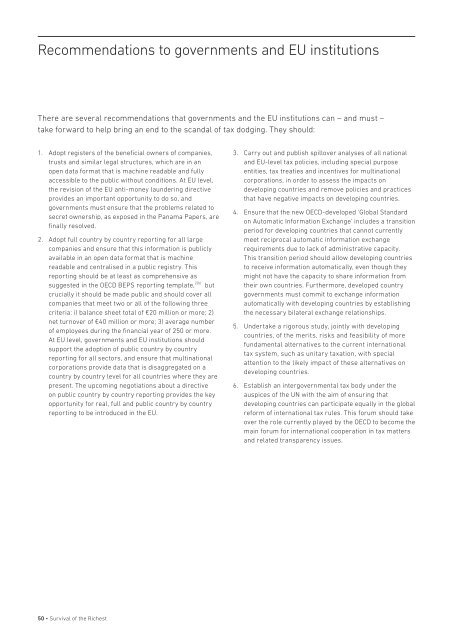You also want an ePaper? Increase the reach of your titles
YUMPU automatically turns print PDFs into web optimized ePapers that Google loves.
Recommendations to governments and EU institutions<br />
There are several recommendations that governments and <strong>the</strong> EU institutions can – and must –<br />
take forward to help bring an end to <strong>the</strong> scandal <strong>of</strong> tax dodging. They should:<br />
1. Adopt registers <strong>of</strong> <strong>the</strong> beneficial owners <strong>of</strong> companies,<br />
trusts and similar legal structures, which are in an<br />
open data format that is machine readable and fully<br />
accessible to <strong>the</strong> public without conditions. At EU level,<br />
<strong>the</strong> revision <strong>of</strong> <strong>the</strong> EU anti-money laundering directive<br />
provides an important opportunity to do so, and<br />
governments must ensure that <strong>the</strong> problems related to<br />
secret ownership, as exposed in <strong>the</strong> Panama Papers, are<br />
finally resolved.<br />
2. Adopt full country by country reporting for all large<br />
companies and ensure that this information is publicly<br />
available in an open data format that is machine<br />
readable and centralised in a public registry. This<br />
reporting should be at least as comprehensive as<br />
suggested in <strong>the</strong> OECD BEPS reporting template, 206 but<br />
crucially it should be made public and should cover all<br />
companies that meet two or all <strong>of</strong> <strong>the</strong> following three<br />
criteria: i) balance sheet total <strong>of</strong> €20 million or more; 2)<br />
net turnover <strong>of</strong> €40 million or more; 3) average number<br />
<strong>of</strong> employees during <strong>the</strong> financial year <strong>of</strong> 250 or more.<br />
At EU level, governments and EU institutions should<br />
support <strong>the</strong> adoption <strong>of</strong> public country by country<br />
reporting for all sectors, and ensure that multinational<br />
corporations provide data that is disaggregated on a<br />
country by country level for all countries where <strong>the</strong>y are<br />
present. The upcoming negotiations about a directive<br />
on public country by country reporting provides <strong>the</strong> key<br />
opportunity for real, full and public country by country<br />
reporting to be introduced in <strong>the</strong> EU.<br />
3. Carry out and publish spillover analyses <strong>of</strong> all national<br />
and EU-level tax policies, including special purpose<br />
entities, tax treaties and incentives for multinational<br />
corporations, in order to assess <strong>the</strong> impacts on<br />
developing countries and remove policies and practices<br />
that have negative impacts on developing countries.<br />
4. Ensure that <strong>the</strong> new OECD-developed ‘Global Standard<br />
on Automatic Information Exchange’ includes a transition<br />
period for developing countries that cannot currently<br />
meet reciprocal automatic information exchange<br />
requirements due to lack <strong>of</strong> administrative capacity.<br />
This transition period should allow developing countries<br />
to receive information automatically, even though <strong>the</strong>y<br />
might not have <strong>the</strong> capacity to share information from<br />
<strong>the</strong>ir own countries. Fur<strong>the</strong>rmore, developed country<br />
governments must commit to exchange information<br />
automatically with developing countries by establishing<br />
<strong>the</strong> necessary bilateral exchange relationships.<br />
5. Undertake a rigorous study, jointly with developing<br />
countries, <strong>of</strong> <strong>the</strong> merits, risks and feasibility <strong>of</strong> more<br />
fundamental alternatives to <strong>the</strong> current international<br />
tax system, such as unitary taxation, with special<br />
attention to <strong>the</strong> likely impact <strong>of</strong> <strong>the</strong>se alternatives on<br />
developing countries.<br />
6. Establish an intergovernmental tax body under <strong>the</strong><br />
auspices <strong>of</strong> <strong>the</strong> UN with <strong>the</strong> aim <strong>of</strong> ensuring that<br />
developing countries can participate equally in <strong>the</strong> global<br />
reform <strong>of</strong> international tax rules. This forum should take<br />
over <strong>the</strong> role currently played by <strong>the</strong> OECD to become <strong>the</strong><br />
main forum for international cooperation in tax matters<br />
and related transparency issues.<br />
50 • <strong>Survival</strong> <strong>of</strong> <strong>the</strong> <strong>Richest</strong>


